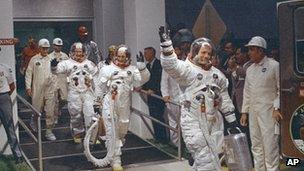Neil Armstrong 'had 20 seconds to make Moon landing decision'
- Published

US astronaut Neil Armstronghas died aged 82. Reg Turnill, who was the BBC's aerospace correspondent when Armstrong became the first man to walk on the Moon, remembers the man and the mission.
"I covered all nine manned missions for the BBC, both radio and television, and I grew up with the astronauts and lived with them.
"When Apollo 11 (the first Moon landing in July 1969) took off we were continuously covering it and it was rolling news long before the term was used. Everything was live but in a very crude way. Nasa fed everything to the media.
"It was routine for me to be at the Cape (Kennedy Space Center at Cape Canaveral in Florida) for launches and lift-offs. It took 60 hours to get to the Moon so we waited until the craft was in orbit and then we had a mad rush to get from Launch Control to Mission Control (in Houston, Texas).
"The astronauts worked out between them who was going to do various missions and that is how it transpired that it was Armstrong who was the first man on the Moon. It had been organised years before.
'Decisive'
"He always said that he only really decided what to say ('One small step for man, one giant leap for mankind') on the way there. He never discussed it with his colleagues Michael Collins and Buzz Aldrin, although they tried to get it out of him.
"Armstrong was the only civilian test pilot, having been recruited in the early days. All the others were military pilots.
"He was very highly trained and had a great ability to make split second decisions. When Apollo 11 reached the point of hovering over the lunar surface Neil Armstrong had 20 seconds to decide whether to continue or abort. He had to be decisive.
"When they came to land they had spent years simulating what it would be like and when they go there it was just like another rehearsal.
"It was accepted that if either Armstrong or Aldrin had broken an ankle or got injured on the lunar surface that the uninjured astronaut would not be able to get them back in the craft because it was a long climb up the ladder. He would have died on the Moon.
'Conspiracy'
"Armstrong was a very diffident and reclusive man. He got tired of being asked: 'What was it like being the first man on the Moon?' and he stopped doing interviews. Of all the astronauts he was the most reclusive. He was a boffin.
"There was no resentment of Armstrong by Aldrin or Collins that one could detect. They were professional astronauts. But when they finished work they all went home. They never socialised together.
"At the time there was a space race between Russia (the Soviet Union) and America to land the first man on the moon and America won it by a very narrow distance.
"Nowadays Russia and America work together on the International Space Station.
"Some people claim the Moon landing was faked (in the desert of Arizona), but if the Moon landing had been simulated and faked I would have to have been part of the conspiracy."
Reg Turnill is the author of The Moonlandings: An Eyewitness Account
- Published26 August 2012
- Published25 August 2012
- Published25 August 2012